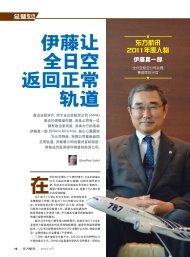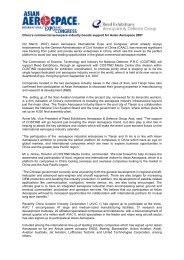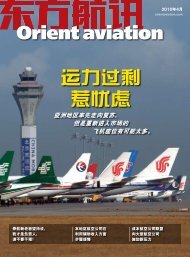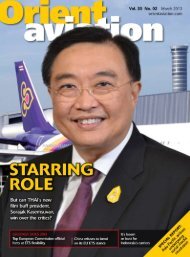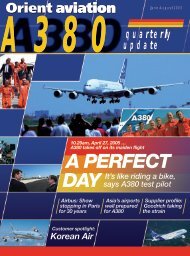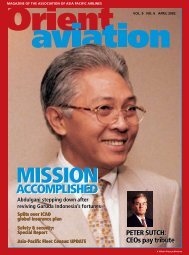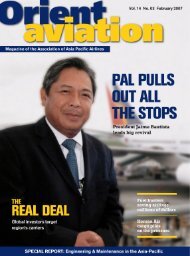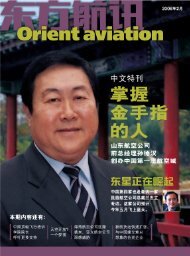Create successful ePaper yourself
Turn your PDF publications into a flip-book with our unique Google optimized e-Paper software.
49TH ASSEMBLY OF PRESIDENTS<br />
Global health authorities<br />
are working feverishly to<br />
prepare for a potentially<br />
disastrous flu pandemic.<br />
With the experience of<br />
SARS still fresh in their minds, airlines<br />
are nervous, but they are more concerned<br />
there may be over-reaction to the possibility<br />
of an outbreak long before any real threat<br />
emerges.<br />
The Asia-Pacific’s major airlines have a<br />
message for air travellers concerned about<br />
the dangers of a global outbreak of Avian<br />
Flu: do not panic.<br />
For public health authorities around the<br />
world, they have another piece of advice:<br />
knee jerk reactions risk igniting public panic,<br />
producing a very high, indirect economic and<br />
social cost disproportionate to any public<br />
health benefit.<br />
The major worry for airlines is that<br />
worldwide publicity, some of it highly<br />
sensational, has given the travelling public<br />
an exaggerated perception of the dangers of<br />
Avian Flu.<br />
“The actual situation today has very<br />
little in the way of travel implications unless<br />
you happen to be in the poultry farming<br />
business,” said Association of Asia Pacific<br />
Airlines (AAPA) director general, Andrew<br />
Herdman.<br />
“There is no reason for concern among<br />
the travelling public unless you are going to<br />
a poultry farm in affected areas, or shipping<br />
live birds. Other than that it is business<br />
as usual and there is no reason to think<br />
otherwise.”<br />
The AAPA passed a resolution at its<br />
Avian Flu: airlines<br />
fear over-reaction<br />
Assembly of Presidents which called for<br />
governments, health authorities and the<br />
media to “act responsibly during health<br />
related crises” and said the current outbreak<br />
of the H5N1 Avian Flu virus has caused<br />
widespread fears of a human flu pandemic,<br />
even though it has been categorized by the<br />
World Health Organisation (WHO) as being<br />
in Phase 3 of their contingency planning<br />
framework. This means it is an infectious<br />
disease, but without evidence of human-tohuman<br />
transmission.<br />
The call for calm came just days after<br />
the World Bank assessed the potential<br />
economic impact of an Avian Flu pandemic<br />
would be around US$800 billion. The AAPA<br />
Assembly also heard a call from James<br />
May, president and chief executive of the<br />
Air Transport Association (ATA), the body<br />
representing U.S. airlines, that the possibility<br />
of a pandemic should be taken seriously. It<br />
made sense for airlines around the world to<br />
develop plans to contain and respond to any<br />
threat, he said.<br />
However, he also cautioned against overreaction,<br />
and said experts in the field “tell us<br />
we are not likely to see a widespread outbreak<br />
of Avian Flu in humans this year”. He pointed<br />
out the population of the planet is 45 billion,<br />
but there have only been about 130 confirmed<br />
cases of human Avian Flu.<br />
May said there would be people boarding<br />
aircraft travelling to and from Asia who will<br />
display symptoms of flu, but will not have<br />
Avian Flu.<br />
Herdman said Asian airlines are working<br />
on contingency plans in the same way as they<br />
would prepare for any other unexpected or<br />
undesirable event, whether they were air<br />
disasters, terrorist attacks or other crises.<br />
“You do contingency planning, but you do it<br />
in the context of knowing it is a hypothetical<br />
issue. In terms of the human flu pandemic, it<br />
may not be bird flu related. It may simply be<br />
a form of human flu pandemic.”<br />
Governments needed to be aware of the<br />
need to maintain the public’s confidence<br />
and to accelerate international contingency<br />
planning measures without igniting public<br />
panic disproportionate to the actual risk<br />
level, said the AAPA’s resolution.<br />
They should also be aware of the<br />
implications when issuing travel advisories<br />
and avoid adopting arbitrary measures with<br />
the potential to cause unnecessary disruption<br />
to normal economic and social activities.<br />
Members of the AAPA executive committee, Cathay Pacific, Japan Airlines, Singapore Airlines, Philippine Airlines<br />
and Malaysia Airlines and Secretariat officials address the media during the assembly<br />
16 ORIENT AVIATION DECEMBER 2005-JANUARY 2006


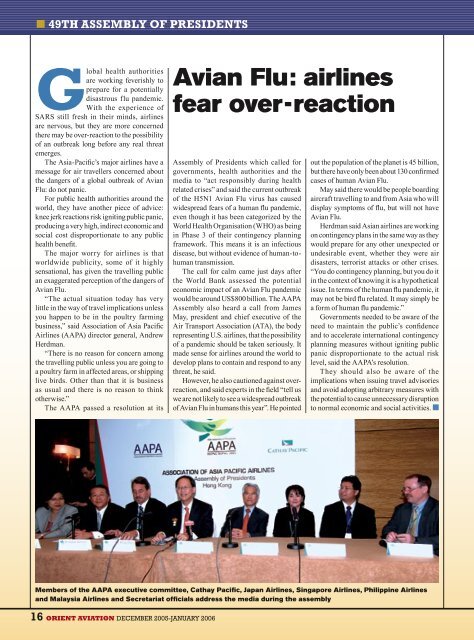

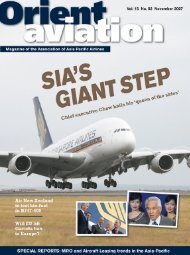
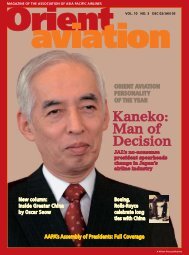
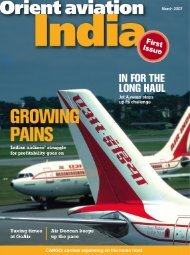
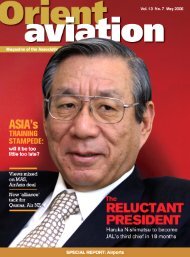
![OAMag-V7N4-Cover [Converted] - Orient Aviation](https://img.yumpu.com/48598575/1/190x255/oamag-v7n4-cover-converted-orient-aviation.jpg?quality=85)
